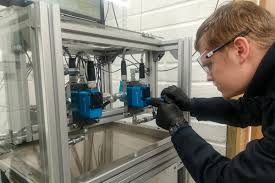Cutting-edge hydraulic systems developed in Bristol that could bring about a step change in sustainable aviation are to be showcased alongside the world’s leading aerospace technology next week.
Domin, the firm behind the ground-breaking systems, is exhibiting at the Farnborough International Airshow, the global gathering of the leading aerospace companies. 
With aircraft manufacturers such as Airbus and Boeing and airlines desperate to address concerns over the impact of flying on climate change, Domin believes it has a timely answer to the complex problem of making planes lighter.
The firm, which last year opened a technology centre at Pucklechurch, is utilising new enabling tools such as metal 3D printing, brushless DC motors, high-speed digital electronics and control to develop hydraulic products that can change the way the aerospace industry uses motion control.
Domin chief technology officer Simon Jones said: “Aerospace is a really great case study for hydraulics.
“The average [Boeing] 777 aeroplane carries around two-and-a-half tonnes of hydraulic equipment on board. This will consist of pumps, over 2km worth of piping, valves, actuators and more.
“The fuel required to lift and to power those hydraulic systems is huge, especially for long-haul flights.
“So, in a world where people are spending sometimes millions to save grammes, this seems like such a ripe space for innovation.”
Domin’s high-tech hydraulic products allows for the generation of pressure from electricity in a very complex fashion, as well as modulating that pressure in a very high bandwidth fashion.
The core technology consists of ultra-compact high-performance pumps and high-speed switching valves.
These core capabilities can be brought together in various ways to develop specific products that enable innovation in different markets.
Over the past five years Domin has been combining its core technologies to provide products, including flight control, powerpacks and brakes, that allow ‘More Electric’ architectures to be realised within aviation, with support from NATEP and the Aerospace Technology Institute (ATI).
Simon added: “We’ve gone from some very crude demonstrators, all the way through to real representative testing on helicopter braking systems, proving out a complete removal of a central hydraulic system and a replacement with these really compact, high performance electrohydrostatic actuators.
“We are 100% focused on changing the way the aerospace industry uses power and motion control, and really enabling this transition to More Electric flight and to therefore more sustainable aviation for more people.
“So, for us, the big driver for the next few years is to take both our valve products and our electrohydrostatic products and get them flying.”
Last year Domin was chosen to take part in the government’s £35m Project LandONE to revolutionise aircraft actuation systems, develop more electric aircraft and promote more sustainable air travel.
It was also awarded £4.4m to take part in a research project that could revolutionise electric vehicle performance.
The firm is working with Mercedes-Benz subsidiary YASA and Cranfield University on the initiative called Project Additive, which aims to develop integrated wheel motor and active suspension technology that will deliver new levels of electric vehicle performance.
Domin will adapt its world-class active suspension systems to integrate with YASA’s axial technology to give drivers ground-breaking performance and enable vehicles to go further in more comfort.
This will reduce one of the challenges for electric vehicle owners as it will also achieve 10% more range.





























